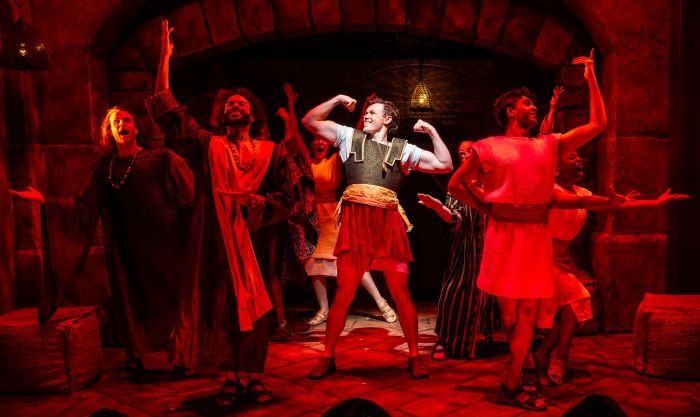Framed in the format of a memory play, David, A New Musical, with music, book, and lyrics by Albert M. Tapper and book and lyrics by Martha Rosenblatt and Gary Glickstein, reimagines the complex and widely disputed story of the titular Old Testament king through 28 numbers (including seven reprises) and a cast of fourteen, in a limited debut engagement at AMT Theater (renovated, funded, and reopened in 2022 by Tapper, who renamed the venue with his initials and serves as its producer). Though set ca. 1000 BCE, as the King of Israel is nearing the end of his life, the anachronistic production, focused on select recollections with his old friend and critic Nathan the prophet, is a throwback to mid-century stylings in its humor, music, language, and design.

Under the direction of Kyle Pleasant, the main episodes are recounted by Nathan (comically portrayed by Kenny Morris) and the elder David, who thinks he is dying (characterized by Timothy Warmen with moods that shift from decisive to self-observant, nostalgic, and happy), and reenacted by his younger self (a determined and laughably self-aggrandizing Ethan Zeph), as he stands by and watches what his mind’s eye conjures. Central to the story is his desire to be remembered as more than “the kid with the slingshot,” thereby leading him to reflect on some of his greatest triumphs and mistakes.
But the story neglects his precocious talent and fame as a harpist, for which he was first called to the court of his predecessor King Saul to cheer him up, and gives short shrift to Bathsheba, who doesn’t appear in the play but with whom he had an affair, had her husband killed, took as his wife (one of eight, in addition to his many concubines), and had Solomon, their second son and chosen successor to the throne (played by Caleb Mathura, who appears briefly at the beginning, taking notes on his dying father’s wishes – among them, his request that Nathan deliver the eulogy at his funeral – and registering droll disbelief).

Instead, the not always historically accurate narrative is centered on David’s evolving relationships with Saul (embodied with changing emotions by Danny Arnold and delivering the second act’s blockbuster song “I Do Not Hate Him”), his son Jonathan (the excellent Jacob Louchheim), who shares a deep love with David (whether brotherly or sexual is still debated by scholars and suggested here, underscored by Jonathan’s awkward first attempt at how to talk to women in the bouncy “Ladies”), and daughter Michal (a poignant Olivia Vadnail), with whom David falls in love at first sight, marries, angers her father, and disappoints her with his long absences and bad decisions (as she laments in “Something Was Ending”).
One of those is his alliance with Achish, ruler of the enemy Philistines (an outstanding and ebullient Jay Aubrey Jones), embraced in their duet “Two Men of Reason.” Another is his fictional debauchery with the company in the sexually suggestive “Sodom and Gomorrah” – believed to have been destroyed more than a millennium before the time of David, who was never said in the ancient texts to have visited but was oddly inserted into the musical, with garish purple, red, and blue lighting by Mary Ellen Stebbins that accentuates the hedonism. That’s a lot of characters, plot points, songs, and storylines to sort out, some of which could be cut or edited for a more concise and correct representation (as could the momentous act of David killing Goliath with his slingshot, presented as a silhouetted shadow scene executed behind translucent white fabric, which lessens its impact by making it more theatrical than immediate).

Along with the lead and supporting cast is the ensemble of Ashley Marie Arnold, Blair Alexis Brown, Bruce Blanchard, Scott Harrison, Garland Ray, and Jodi Snyder, who represent the people, fill up the small stage, and execute Pleasant’s choreography with a predominance of arm extensions, hand gestures, and facial expressions in the limited space, to music that is more in keeping with the show tunes and ballads of Broadway’s past – accompanied by music director David Wolfson on keyboard, Eitan Markowitz on drums, and Ken Rizzo on bass, with oddly muffled sound by Elisabeth Weidner that makes it hard to determine that the unseen band is playing live, not pre-recorded – than an authentic sound of the ancient Middle East.
The silly dated laughs, too, are reminiscent of the stand-up comics, Borscht Belt acts, and sit-coms of the 1950s and early ’60s (e.g., the trouble they have conjugating the verb slay, and Nathan’s response, when David asks him what he means, “I don’t know. I’m a prophet. Prophet’s talk like that”). And while James F. Fenton’s set, props by Tamara Flannagan, and costumes by Ashley Soliman evoke antiquity, they seem equally derived from such 20th-century Biblical epics as Cecil B. DeMille’s 1956 movie classic The Ten Commandments.
Tapper’s anachronistic mash-up is explained in his program notes, stating that David, his favorite Biblical character, “is a man of Yesterday and today.” His motivation for the choice of combining then and now (or relatively recently) is clear, but, for me, the show and music are in need of revisions to make them sharper, funnier, more succinct, and more memorable for our current time.
Running Time: Approximately two hours and 30 minutes, including intermission.
David, A New Musical plays through Saturday, July 13, 2024, at AMT, 354 West 45th Street, NYC. For tickets (priced at $65, plus fees), go online.





